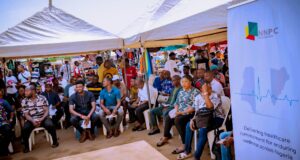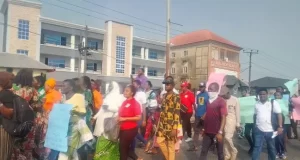by Jenifer Dike………..
The Executive Secretary of the Petroleum Products Pricing Regulation Agency (PPPRA) Mr. Saidu Abdulkadir has said that the current pricing template of the agency took care of the cost of importing and distributing Petroleum Products in Nigeria but this claim by the agency is now at variance to what the oil marketers had explained last week.
Abdulkadir said yestaday that all cost including those of sourcing Foreign Exchange (Forex) and it’s rate by which the Oil Marketing Companies (OMCs) import petroleum products had been considered before coming out with the new petroleum price template.
According to him other associated cost components that include freight rate, trans-shipment cost, statutory charges (NPA, NIMASA), terminal charges (storage and Jetty throughput), financing and distribution margins (Wholesalers/Marketers, Transporters, Retailers, Bridging Fund and Administrative Charges) were duely taken care of.
On the other hand this is different from the claims made by the Major Oil Marketers Association of Nigeria (MOMAN) that the cost inherrent in the importation of Petroleum Products particularly the Premium Motoor Spirit (PMS) is beyond their reach.
Therefore, they no longer import the products but had left the importation in the hands of the Nigerian National Petroleum Corporation (NNPC).
Last week the Executive Secretary of MOMAN Mr. Clement Isong had said that their their challenges include the sourcing of foreign exchange. According to him the official template is about N385 to the dollar and no marketer has been able to source at this price
According to him though some marketers have tried to import but they could not because if they import the marketers will be running distribution cost at a lost.
“NNPC remain the major importer of PMS. Though one or two marketers have tried to bring in the product on their own and because no body can access foreign exchange at the rate of N385 that becomes essentially what the problem is; access to forex” he said
According to him, the N19 per litre distribution cost marketers receive can no longer sustain their businesses. Out of the N19, N7 equalization is removed and when other costs are removed what goes to the marketer is less than one naira. “And unfortunately today it is minus” Isong had lemented.
The Executive Secretary of MOMAN went ahead to analysis that in many countries of the world the distribution cost is about $100 per metric ton. This he said is a good gross margin. In other countries it can be between $60 to $80 per metric tons. ” It is ok and manageable, you can get by. But when you start getting $50/mt for distribution that is a problem the market is not interesting, then to go down to $40/my people start struggling to survive. In Nigeria the distribution cost is $30 to $31/mt on paper and the real cost is over this amount” he said.
Therefore, the marketers said that they need to know from PPPRA the real importation cost.
Though the marketers said that there is an on-going discussion and talk between PPPRA and MOMAN. The discussion with PPPRA is to arrive at a realistic importation price
“If we are unable to arrive at that price then NNPC through PPMC will remain the sole importer of the product because people will not really bring in the product at that price” Isong said.
However, for PPPRA to come out yesterday to claim that all inherrent cost for the business of importing and distribution of PETROLEUM products by oil marketers had been considered before coming out with the new template is curious as both parties are yet to resolve the burning issues of full deregulation.
The agency said that despite deregulation of the downstream aspect of the industry, it would continue to perform regulatory functions.
According to PPPRA, the deregulation of the sector does not take away its control, supervision or oversight functions.
Abdulkadir, said in Abuja that though it no longer fixes the price of Premium Motor Spirit (PMS), it would on a monthly basis, develop a guiding price for the commodity.
He said this became imperative to prevent oil marketers from exploiting consumers, thus enforce the appropriate laws guiding the industry.
It is important to also state that there is nowhere in the world that deregulation means total lack of control, supervision or oversight. While the Market-Based Pricing Regime is a policy introduced to free the market of all encumbrances to investment and growth, it should not be misconstrued to mean a total abdication of government’s responsibility to the Sector and citizenry.
“For the purpose of emphasis, let me reiterate that different sectors of the polity operate under the guidance of national regulators. The Central Bank of Nigeria (CBN) regulates the banks and other financial sector; Nigerian Communication Commission (NCC) regulates telecommunications; National Insurance Commission (NAICOM) regulates the insurance sector and the same exists for operators in Nigeria’s downstream petroleum sector” he said
 Financial Energy Review
Financial Energy Review





